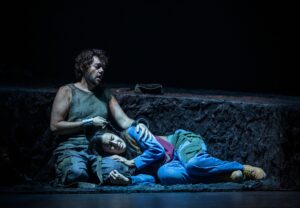
 **** The North American premiere of Leonora, composed by Ferdinando Paer, was presented by the Chicago Opera Theater and offered audiences an extraordinary opportunity to experience a unique adaptation of the story that inspired Beethoven’s only opera, Fidelio. This smaller, more intimate opera house provided a refreshing alternative to the grandeur of larger venues like the Lyric Opera, giving the performance a charm that was both compelling and immersive. The performance was held at the Studebaker Theatre, a gem in Chicago’s cultural landscape, and played on October 1, 4, and 6.
**** The North American premiere of Leonora, composed by Ferdinando Paer, was presented by the Chicago Opera Theater and offered audiences an extraordinary opportunity to experience a unique adaptation of the story that inspired Beethoven’s only opera, Fidelio. This smaller, more intimate opera house provided a refreshing alternative to the grandeur of larger venues like the Lyric Opera, giving the performance a charm that was both compelling and immersive. The performance was held at the Studebaker Theatre, a gem in Chicago’s cultural landscape, and played on October 1, 4, and 6.
Leonora, composed by Paer in 1804, shares much of the same thematic and narrative DNA with Beethoven’s Fidelio, with both operas depicting a courageous woman’s journey to rescue her imprisoned husband. However, Paer’s approach to the material offers a distinct interpretation, presenting Leonora’s bravery and loyalty with unique musical nuances and emotional tones. The Chicago Opera Theater’s decision to stage this relatively obscure opera made for a thrilling cultural moment, giving audiences a glimpse into the rich operatic traditions that often operate in the shadow of Beethoven’s immense legacy.
One of the most remarkable aspects of this production was the intimacy of the Studebaker Theatre. Unlike the Lyric Opera, which has an imposing size, the Studebaker allowed for a closer connection between the performers and the audience. In a space where every seat felt close to the action, the delicate dynamics of the orchestra and the powerful voices of the singers had a clarity and impact that could be lost in a larger hall. Subtitles projected on the front screen and side monitors for the balcony further enhanced the audience’s ability to engage with the story and its intricacies.
The performance featured a strong cast led by Vanessa Becerra, a Peruvian and Mexican American soprano whose portrayal of Leonora was full of depth and emotion. Becerra’s vocal performance carried the intensity of Leonora’s courage and vulnerability across the three-hour opera, and her voice seemed tailor-made for Paer’s lyrical lines. She was educated at the Fort Worth Academy of Fine Arts, and her voice—lyrical yet powerful—was well-suited to convey the mixture of desperation and love that drives Leonora’s actions. Her presence and control on stage captivated the audience, ensuring that every moment of Leonora’s story felt vital and immediate.
Opposite Becerra, Edgardo Rocha brought the character of Florestano to life with compelling passion. As the imprisoned husband, Rocha expressed his character’s desperation and determination, his tenor voice conveying both the suffering and the unwavering hope central to his role. Though Florestano’s time on stage is limited in the first half, Rocha’s presence loomed large, and his eventual reunion with Leonora was a moving culmination of both his vocal prowess and his dramatic presence.
Keely Futterer played Marcellina, the young woman who falls in love with the disguised Leonora, unaware of her true identity. Futterer beautifully captured Marcellina’s naivety and warmth, providing moments of levity amid the opera’s darker themes. Her scenes with Joo Won Kang, who played her father, Rocco, the prison guard, provided some of the production’s most tender moments. Kang, a baritone from South Korea, had just come off performances at the New York Metropolitan Opera in Turandot and La Bohème, and his experience showed. His portrayal of Rocco was nuanced, balancing his character’s moral conflict between duty and compassion.
Rounding out the cast were Matthew Pearce as Don Pizarro, the malevolent prison governor, and Alex Soare as Giachino, with the latter delivering a standout performance. Kameron Alston portrayed Don Fernando, whose role brings about the opera’s resolution. Each cast member brought their character to life with a depth that made the unfolding drama feel immediate and real.
Underpinning all of this was the incredible work of Dame Jane Glover, the acclaimed British conductor whose expertise was evident from the first notes. Glover’s command over the music and orchestra was outstanding, bringing out the unique color of Paer’s score with precision and passion. Her interpretation gave the orchestra a crispness that complemented the singers beautifully, highlighting the dramatic highs and lows of the story. Glover’s ability to bring forth both the grandeur and the intimacy of the score made the performance a remarkable auditory experience, ensuring that the music remained an active storyteller alongside the singers.
Having been a loyal patron of the Lyric Opera for 15 years, I was thoroughly impressed by this production. Chicago Opera Theater’s Leonora exceeded my expectations and even rivaled some of the recent productions staged by larger opera companies. The Studebaker Theatre provided an exceptional experience at accessible ticket prices, ranging from $59 to $150, making high-quality opera available to a wider audience. With easy parking across from Grant Park, it was a convenient and enjoyable experience.
In summary, the North American premiere of Paer’s Leonora by the Chicago Opera Theater was a triumph. It combined a compelling story, masterful singing, a world-class conductor, and the intimacy of a smaller venue, creating an unforgettable evening of opera. This production showcased that opera, even outside the grandiose walls of major houses, can be just as powerful, accessible, and deeply moving. For opera lovers, this was an experience that proved the value of venturing beyond the familiar to discover hidden gems in the world of music.






More Stories
“The Magic School Bus: Lost in the Solar System”
“February House” reviewed by Julia W. Rath
” A Lie of The Mind”